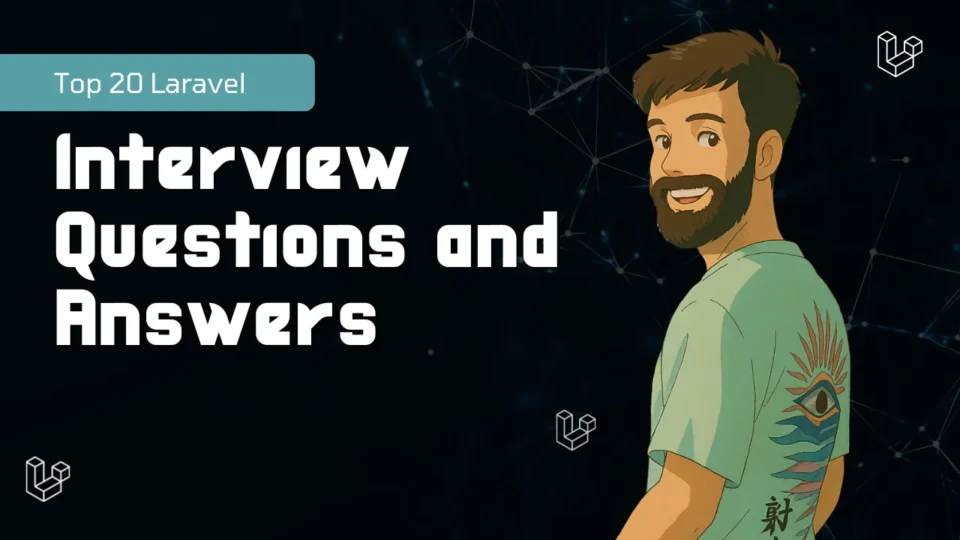Here are the Top 20 Laravel Interview Questions and Answers (2025 Edition) — ideal for freshers to mid-level developers.
✅ 1. What is Laravel?
Answer:
Laravel is an open-source PHP web framework used for developing web applications following the MVC (Model-View-Controller) architectural pattern. It provides built-in features like routing, authentication, migrations, and more.
✅ 2. What are the key features of Laravel?
Answer:
- MVC Architecture
- Eloquent ORM
- Artisan CLI
- Blade Templating Engine
- Routing and Middleware
- Authentication & Authorization
- Database Migrations and Seeding
- Queues and Jobs
- RESTful Resource Controllers
✅ 3. What is Middleware in Laravel?
Answer:
Middleware filters HTTP requests entering your application. Example: auth middleware checks if the user is authenticated.
✅ 4. What is the use of Route in Laravel?
Answer:
Routes define the URL structure of your application and map them to controller methods or closures.
Example:
Route::get('/user', [UserController::class, 'index']);
Top 20 Laravel Interview Questions and Answers
✅ 5. What is the difference between get() and pluck() in Eloquent?
Answer:
get()returns all columns of matching records.pluck()returns a single column value as a collection.
Example:
User::pluck('name'); // Only names
User::get(); // All fields
✅ 6. What is Eloquent ORM?
Answer:
Eloquent is Laravel’s built-in ORM that provides an ActiveRecord implementation to interact with databases using PHP syntax instead of SQL.
✅ 7. How to create a migration in Laravel?
Answer:
php artisan make:migration create_users_table
It creates a migration file in database/migrations/.
✅ 8. What is the use of artisan in Laravel?
Answer:
Artisan is the command-line interface in Laravel used for tasks like generating code, running migrations, clearing cache, etc.
Example:
php artisan route:list
✅ 9. What is the difference between hasOne and belongsTo in Laravel?
Answer:
hasOne: The current model owns another.belongsTo: The current model belongs to another.
✅ 10. How do you implement validation in Laravel?
Answer:
Using the validate() method:
$request->validate([
'name' => 'required|string|max:255',
]);
Top 20 Laravel Interview Questions and Answers
✅ 11. What is a Service Provider in Laravel?
Answer:
Service Providers bootstrap the application and register services (bindings, event listeners, etc.) in the Laravel service container.
✅ 12. How does Laravel handle authentication?
Answer:
Laravel uses the Auth facade and comes with prebuilt routes, controllers, and views through:
php artisan make:auth // (for older versions)
New versions use Laravel Breeze, Jetstream, or Fortify.
✅ 13. What is CSRF protection in Laravel?
Answer:
Laravel uses CSRF tokens to prevent Cross-Site Request Forgery attacks. Use @csrf in forms.
✅ 14. How to use caching in Laravel?
Answer:
Cache::put('key', 'value', 60); // Store for 60 minutes
$value = Cache::get('key');
✅ 15. What is a Seeder in Laravel?
Answer:
Seeders are used to populate database tables with sample or test data.
Example:
php artisan make:seeder UsersTableSeeder
Top 20 Laravel Interview Questions and Answers
✅ 16. Explain Laravel’s file storage system.
Answer:
Laravel provides a unified API for different file systems like local, S3, FTP.
Storage::disk('local')->put('file.txt', 'Content');
✅ 17. What is a Facade in Laravel?
Answer:
A facade provides a “static” interface to classes in the service container.
Example:
Cache::get('key');
✅ 18. How to use queues in Laravel?
Answer:
- Jobs are dispatched using:
dispatch(new SendEmailJob($user));
- Laravel supports drivers like database, Redis, and SQS.
✅ 19. What is the purpose of the boot() and register() methods in a ServiceProvider?
Answer:
register()is used to bind classes into the service container.boot()is used to execute code after all services are registered.
✅ 20. What are Observers in Laravel?
Answer:
Observers allow you to listen to Eloquent model events (like creating, updating, deleting, etc.).
User::observe(UserObserver::class);
Top 20 Laravel Interview Questions and Answers
Table of Contents
Top 20 Laravel Interview Questions and Answers




1 comment
[…] Top 20 Laravel Interview Questions and Answers […]